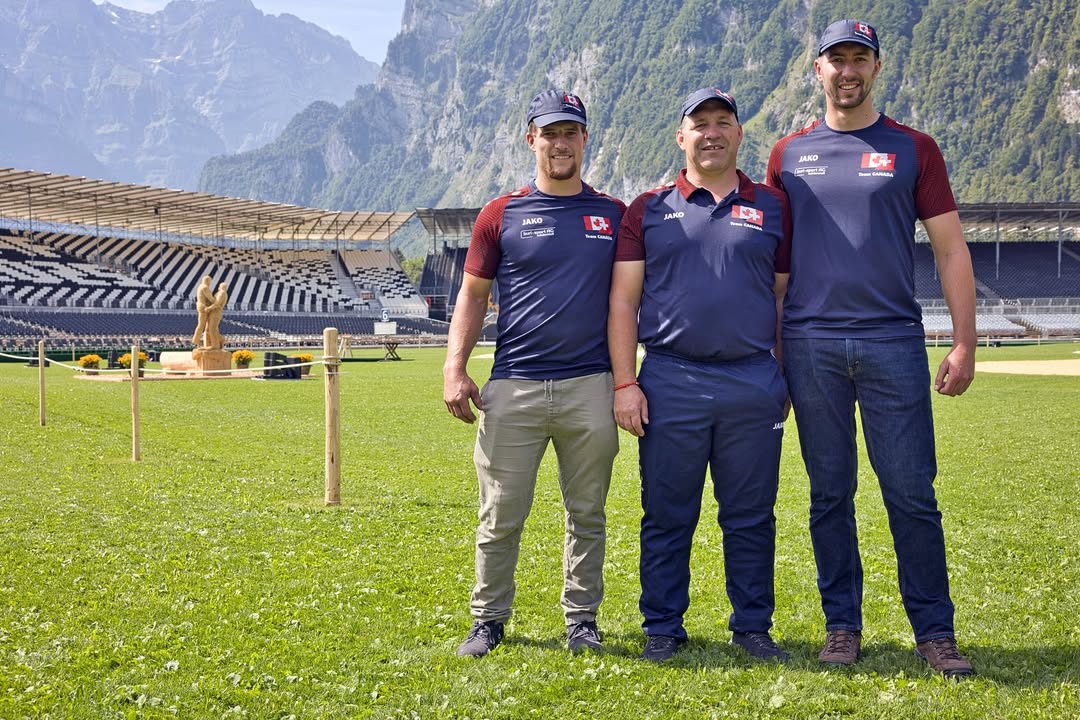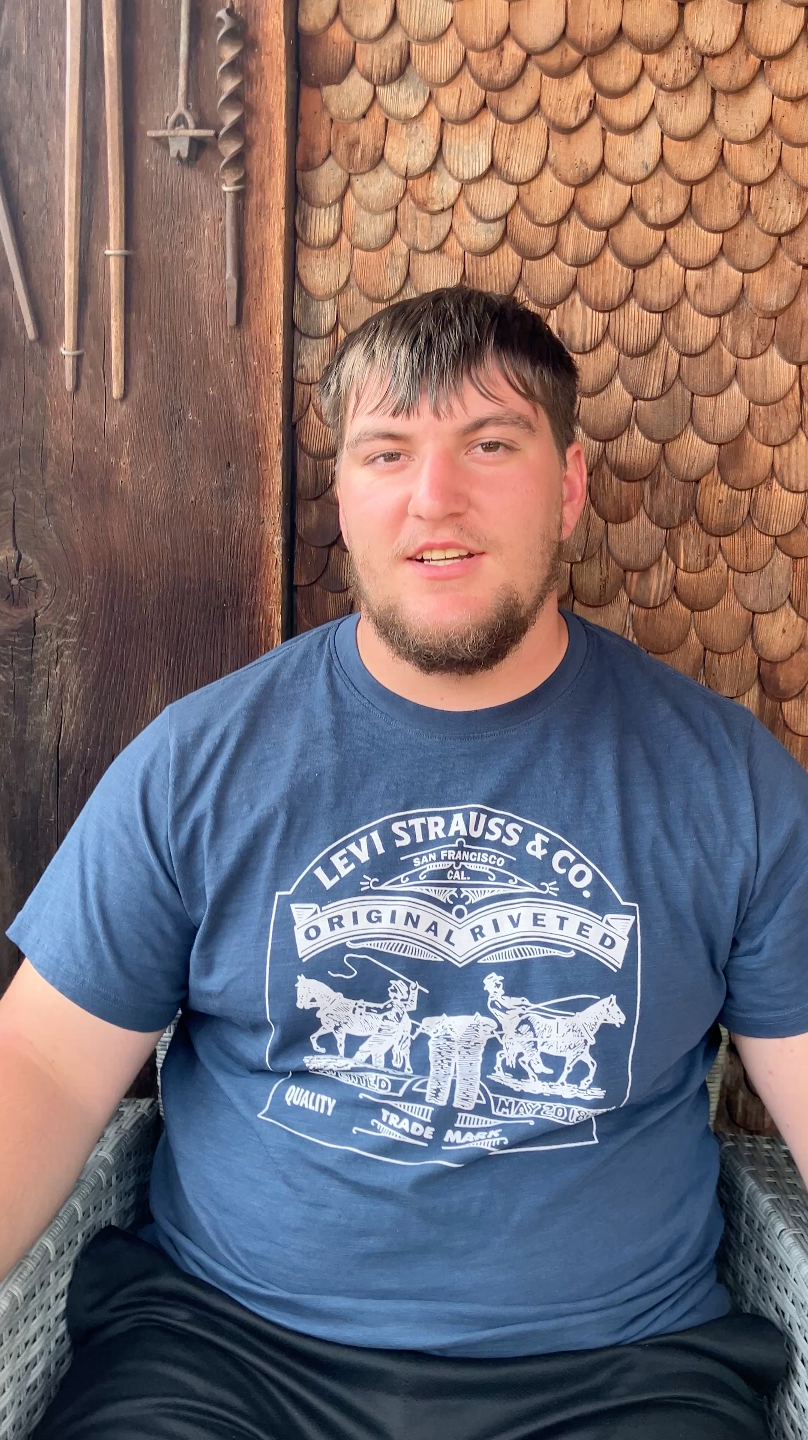
Swiss wrestlers from abroad are proud of their tradition

Six Swiss expats from North America are heading to Mollis in canton Glarus, for the 2025 Federal Wrestling and Alpine Games Festival (Schwingfest). For some, it’s their first time setting foot in Switzerland – for others, it’s familiar ground.
They may live far from Switzerland, but that hasn’t stopped them from embracing one of its oldest sporting traditions. This weekend, six North American wrestlers will step into the sawdust ring to compete in Swiss wrestling, known as Schwingen.
Four of the wrestlers come from the US – Marshall Brockway (19), Peter Ming (23), Brenden Spahr (26) and Patrick Richardson (38). The Canadian contingent comprises Thomas Badat (28) and Martin Mathis (29).
What brings them together isn’t just their Swiss roots; it’s the fact they’ve trained far from the heart of the Swiss wrestling scene, driven by a shared passion for the sport.
“There aren’t many people in Canada who practise Schwingen,” says Badat during his first training session in Swiss sawdust this year, in Schänis. He speaks both Swiss German and Quebec French.
Training back home isn’t easy for him. “Most of the wrestlers are farmers and don’t have much time to practise,” says Badat, who co-runs a fencing business in Kingsey Falls, Quebec. Still, they manage to squeeze it in somehow.
Feeling a bit lost in Switzerland
The Swiss Abroad have a local guide in Adrian Oertig, a seasoned wrestler who has competed at the Schwingfest six times. It is his third time mentoring the overseas team. “They often feel a bit lost here, especially those visiting Switzerland for the first time,” says Oertig.

Take Marshall Brockway, for example. He’s from Silver Creek, Washington, a village that could easily be mistaken for one in the Emmental. Last weekend, the road builder took part in his first Swiss wrestling event in Einsiedeln, in canton Schwyz.
Brockway’s family left Switzerland for the US four generations ago, but they’ve kept close ties with the Swiss community in the Pacific Northwest. “I’ve been wrestling with my uncles and cousins since I was a kid – it has always been a big part of who I am,” he told Swissinfo.
Badat says he first got into Schwingen as a kid and it still raises eyebrows back home. “Most people who know the sport are either Swiss or have Swiss friends. Everyone else just asks, ‘What’s that?’” he says. His answer? “Google it – it’s brilliant.”
A big moment for Swiss wrestlers abroad
Saturday’s arena entrance will be a big moment for the six overseas wrestlers. For five of them, it’s their first time competing at the Schwingfest. “It’s a huge honour,” says Spahr. He knows just how tough it is to qualify in Switzerland. “To be one of only four Americans taking part means the world to me,” says Spahr, a middle school teacher who also coaches football and wrestling.

Spahr is especially proud to carry on the family tradition. “I’ve always been into sport. My dad was my coach and on Sundays we would sit down and watch highlights from Swiss wrestling festivals on TV,” says Spahr, who was adopted as a child. For him, it was more than just a routine: “Wrestling made me feel connected to my dad, to Swiss culture and to my family’s roots.”
The overseas wrestlers will enter the arena as their own delegation. The venue seats 56,500 spectators and is said to be the world’s largest mobile arena, featuring seven rings and 37 tonnes of sawdust.
“It’s a real source of pride coming here,” says Badat. He’s the most experienced of the overseas Swiss, now competing at his third Schwingfest. The toughest part, he says, is the travel: adjusting to a new environment, coping with jet lag, and trying to perform well outside his usual routine. “You’re not sleeping in your own bed and that does make a difference,” he adds.
Every three years, Switzerland comes together for one of its most iconic sporting events: the Federal Wrestling and Alpine Games. At its core are two traditional disciplines: Schwingen (Swiss wrestling) and stone throwing, with wrestling taking centre stage.
The first edition of the games took place in 1895 in Biel. Today, the Schwingfest is the biggest and most prestigious event in Swiss wrestling.
A total of 274 wrestlers are set to compete, with more than 350,000 spectators expected to attend. At the end of it all, one athlete will be crowned Schwingerkönig – the king of Swiss wrestling.
The event is organised on a rotating basis by the regional branches of the Swiss Wrestling Federation.
Realistic ambitions
So what are the overseas wrestlers aiming for? A win in the sawdust? A wreath? “I’m mainly here to learn and gain experience,” says Spahr. “Anything beyond is a bonus.” He has already picked up plenty from his last two cantonal competitions and says the team has significantly improved.
Badat has bigger ambitions. “Of course, the aim is to win – same as everyone. But I’m keeping it realistic. If I do win, it will be a big achievement,” says Badat, who has already won several judo titles in Canada.
As a father of three, Badat hopes to pass the wrestling tradition on. “My son loves Schwingen, maybe he’ll follow in my footsteps,” he says. But if his kids choose a different sport, that’s fine too. “As long as they’re happy,” he adds.
What is your opinion? Join the debate:
Edited by Balz Rigendinger /ac.
This article was updated after publication to reflect that Connor Treat was unable to participate due to an injury and was therefore replaced by Patrick Richardson.

In compliance with the JTI standards
More: SWI swissinfo.ch certified by the Journalism Trust Initiative






























You can find an overview of ongoing debates with our journalists here . Please join us!
If you want to start a conversation about a topic raised in this article or want to report factual errors, email us at english@swissinfo.ch.